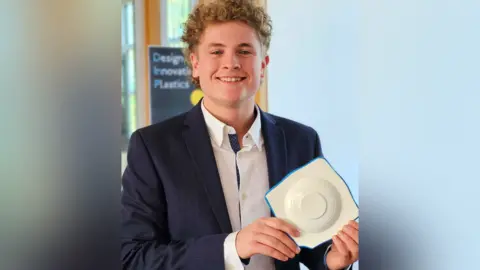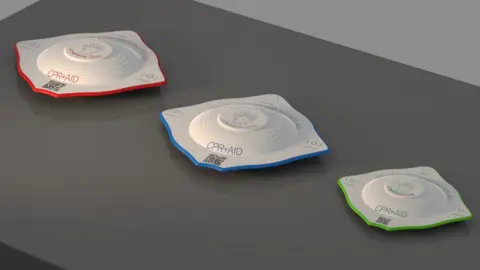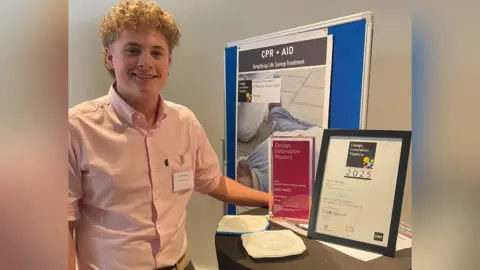Student's joy after CPR device wins national award
 Design Innovation in Plastics
Design Innovation in PlasticsA student who designed a potentially lifesaving device to help a person perform CPR correctly has won a national award.
Harry Wragg created a prototype at Leicester's De Montfort University (DMU), which clicks when the person carrying out compressions on the chest uses the correct amount of force.
The 21-year-old said he wanted to design a product to give people confidence to help save a life, adding he was "overwhelmed" to have won this year's Design Innovation in Plastics Awards (DIP).
Dr Thomas Weir, who helps raise awareness and skills around cardiac arrest at the university, said Harry's device was a "great invention" and hoped to use it in training sessions at the campus.
 Design Innovation in Plastics
Design Innovation in PlasticsThe small dome-shaped device, named CPR+Aid, is made from plastic with no electronics.
Harry, originally from Portsmouth, who has now graduated in product design from DMU, created three prototypes - each designed for a specific age group and body type.
"My research had shown a lack of first aid training and lack of defibrillator availability, so I wanted to design something that would give people the confidence to help save a life," he said.
"People can be scared of breaking the ribs when performing CPR, so don't apply enough pressure for it to be effective.
"But if they use the device and hear the clicks under each compression, they know they are performing CPR correctly and will know that they have done everything they can to save the person."
 Design Innovation in Plastics
Design Innovation in PlasticsHarry was selected from six finalists and received first place at an awards ceremony on Friday.
"The win hasn't really sunk in; it was quite an overwhelming experience, and I was surprised given the high quality of the competition," he said.
"Winning has reinforced my confidence in my own ability to create something that can save lives and have an impact on society."
The graduate said his dream would be to see the device in first aid boxes.
According to the British Heart Foundation, each minute that passes without CPR can decrease the chance of survival by up to 10%.
Dr Weir said: "CPR doesn't need to be perfect - attempting CPR is vastly better than doing nothing.
"But a common error is people underestimate how much force needs applying on each compression - that's why Harry's device is particularly great, whether for training or the real thing.
"If it even saves one life, then Harry can be rightly proud of himself."
Richard Brown, chairman of judges at DIP, said: "We were very impressed with the simplicity of the product, the thought which had been given to material selection and how it would be manufactured, including being upscaled to meet demand.
"We believe it is a product that challenges the current CPR approach and could save lives."
The judges awarded second to Krzysztof Boroniec, from Technological University Dublin, for a chewing device and third to Abbie Williams, from Nottingham Trent University, for a knee-strengthening brace.
Follow BBC Leicester on Facebook, on X, or on Instagram. Send your story ideas to [email protected] or via WhatsApp on 0808 100 2210.
